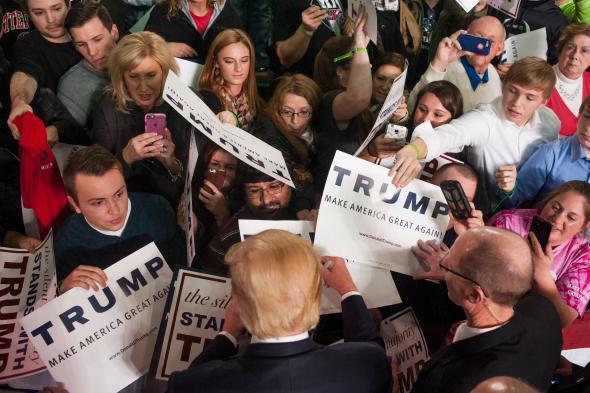Donald Trump has said and done a lot of outlandish things while running to be president of the United States, but perhaps none as dangerous as this. “I’m afraid the election is going to be rigged, I have to be honest,” the Republican nominee told supporters at a Monday rally in Columbus, Ohio. Appearing on Fox News later that night, Trump elaborated in his usual evidence-free way: “Nov. 8, we’d better be careful, because that election is going to be rigged. And I hope the Republicans are watching closely or it’s going to be taken away from us.”
Trump, of course, is no stranger to making fact-free assertions and spreading conspiracy theories for his own political and personal benefit. He laid the groundwork for his current presidential campaign by beating the Birther drum for years, and more recently hinted that President Obama was an ISIS sympathizer and suggested that Ted Cruz’s father was somehow involved in the assassination of JFK. Spreading those falsehoods—as well as a whole host of others about Hispanics, blacks, and Muslims—has done an unquantifiable amount of damage to the nation’s political discourse. His suggestion that the 2016 election will be illegitimate, though, could do damage to the republic itself.
Trump’s latest allegation is, in the words of the usually staid Associated Press, an “unprecedented assertion by a modern presidential candidate,” one that could “threaten the tradition of peacefully contested elections and challenge the very essence of a fair democratic process.” Trump has laid the groundwork for only two possible outcomes in the eyes of his most passionate supporters: He wins the presidency, or he has it stolen from him. Anyone wondering what the worst-case scenario would be in the event Trump loses to Clinton need only look to the dark picture painted late last week by Roger Stone, one of Trump’s longtime political advisers.
During an interview with Breitbart’s Milo Yiannopoulos, Stone suggested that Trump begin talking “constantly” about the possibility of a rigged election, advice the GOP nominee appears to be taking to heart. “He needs to say for example, today would be a perfect example: ‘I am leading in Florida. The polls all show it. If I lose Florida, we will know that there’s voter fraud,’ ” Stone said. “ ‘If there’s voter fraud, this election will be illegitimate, the election of the winner will be illegitimate, we will have a constitutional crisis, widespread civil disobedience, and the government will no longer be the government.’ ” Stone went on:
If you can’t have an honest election, nothing else counts. I think he’s gotta put them on notice that their inauguration will be a rhetorical, and when I mean civil disobedience, not violence, but it will be a bloodbath. The government will be shut down if they attempt to steal this and swear Hillary in. No, we will not stand for it. We will not stand for it.
This is not the first time Team Trump has suggested that violence would occur if a “rigged” system prevented their man from getting his way. Toward the end of the GOP primary when anti-Trump Republicans were plotting a contested convention to deny him the nomination, the candidate himself predicted that there would be “riots” as a result while Stone suggested he’d make public the hotel room numbers of any disloyal RNC delegates so that Trump’s supporters could pay them a “visit.” At this point it should be clear these are not off-hand comments; this is a political strategy.
The worst, though, doesn’t need to happen for Trump’s “rigged” narrative to do lasting damage to American democracy. Even if we set aside the prospect of widespread violence from his supporters, Trump’s comments risk delegitimizing a Clinton victory—and as result, an ensuing Clinton presidency—in the eyes of many Americans. (As the Washington Post’s Greg Sargent points out, the lock-her-up-themed GOP convention already planted that seed.) Put another way: Until now, the greatest dangers posed by Trump were predicated on him winning this November. Now he’s dangerous even if he loses.
